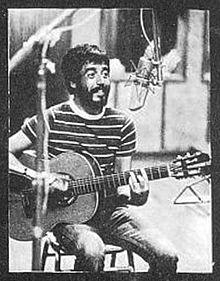Eduardo Mateo
Appearance
Eduardo Mateo | |
|---|---|
 Eduardo Mateo in the Estudio ION, Buenos Aires, Argentia, 1971 | |
| Background information | |
| Birth name | Angel Eduardo Mateo Lopez |
| Born | September 10, 1940 Montevideo, Uruguay |
| Died | May 16, 1990 |
| Genres | Rock, Candombe, world music |
| Occupation(s) | Singer, composer, arranger, musician |
| Instrument(s) | Voice, guitar, percussion |
| Years active | 1960-1990 |
Eduardo Mateo (1940–1990) was a Uruguayan singer, songwriter, guitarist, and arranger. He played an important role in the development of modern Uruguayan music that combines beat, jazz, bossa nova and local rhythms like candombe in a way similar to Brazilian Tropicalismo. Academy Award-winner Jorge Drexler cited Mateo as a big influence.
His songs have been performed by Pedro Aznar, Martin Buscaglia, Hugo Fattoruso, Fernando Cabrera, Leon Gieco, Mio Matsuda, Sandra Mihanovich, Milton Nascimento, Jaime Roos, and Tomohiro Yahiro.
Discography
- Mateo solo bien se lame (De la planta Argentina, 1972)
- Mateo solo bien se lame (De la planta, 1972)
- Cuerpo y alma (Sondor, cassette and vinyl, 1984)
- La Maquina del Tiempo presenta a: Mateo / Mal tiempo sobre Alchemia (1er. viaje) (Ayui/Tacuabe a/e69k. 1987)
- La Maquina del Tiempo / La mosca (Orfeo, 1989)
- La Máquina del Tiempo / 3er. viaje, 1ª parte: Ida (1971 – 1984) (Ayuí/Tacuabé ae133cd, 1995)
- La Máquina del Tiempo / 3er. viaje, 2ª parte: Vuelta (1983 – 1988) (Ayuí/Tacuabé ae134cd, 1995)
- El Tartamudo (2000)
References
Wikimedia Commons has media related to Eduardo Mateo.
